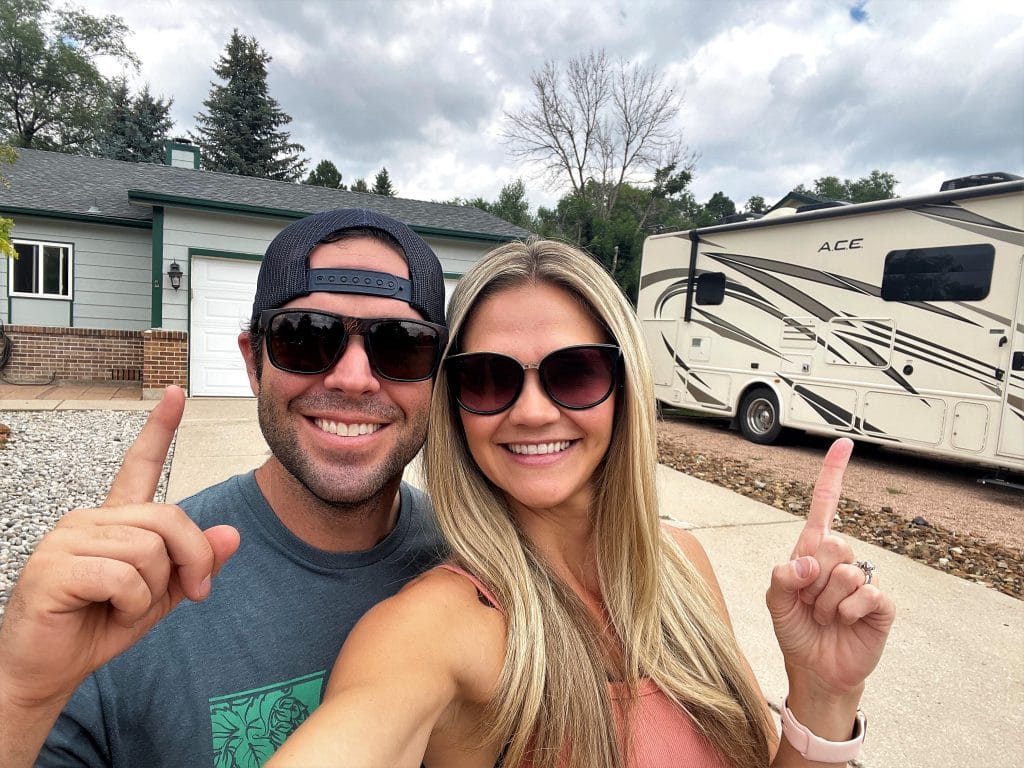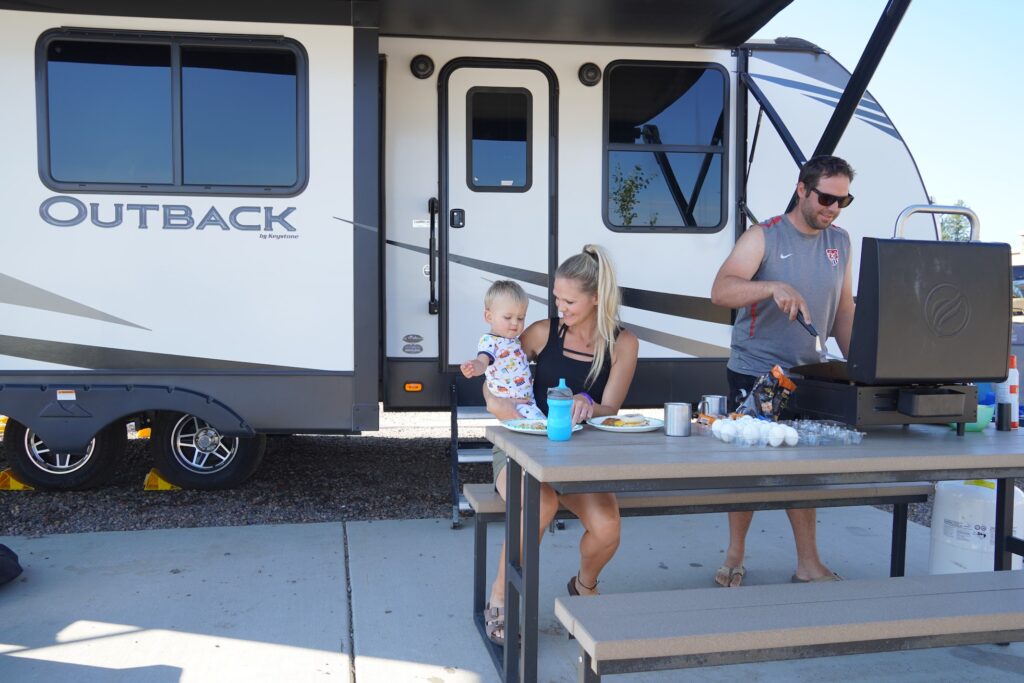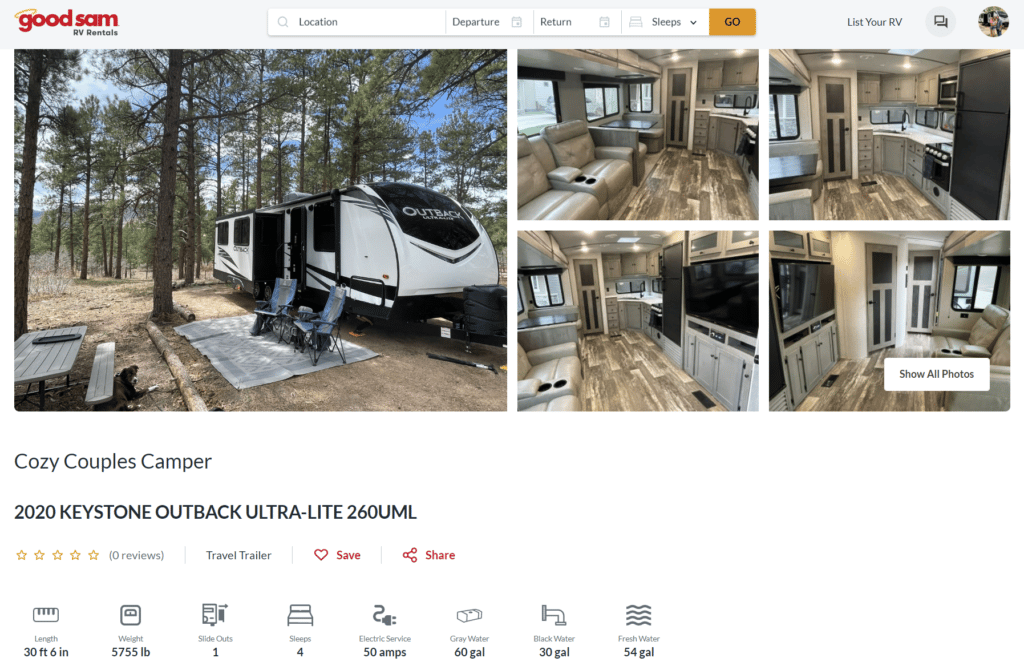*Disclaimer: This post is part of a content series sponsored by Camping World. All opinions are our own.
In the past, you could really only rent an RV from companies like Cruise America or El Monte that had huge fleets of class C motorhomes. But in more recent years, several rental companies have popped up that allow RV owners to privately rent out their RVs and campers directly to renters. It’s made a lot of RV owners ask themselves: “should I try to make extra money instead of having my camper sit in storage?”.
We’ve had six years of RVing experience and have been through four different RVs and campers in that time. We even full-time RVed the country for two of those years! But when it came to the idea of renting out any of our RVs, we were too nervous.
However, about a year ago we decided to list our house as a short-term vacation rental on VRBO and Airbnb. We decided it was a great way to allow us to travel in our RV whenever we wanted but also have a home to come back to. We couldn’t afford both lifestyles, so short-term renting was a great way to pay for our mortgage when we were away, and sometimes even pay for our RV travel costs, too.
We’ve had a great experience with short term renting our house and we figured, if we had the courage to rent out our house, certainly we could rent out our camper, too! So we gave it a try and, just like the house, have had good success. We hope if you’re an RV owner considering renting your camper out that this post helps you feel prepared and confident to try it, too!

Reasons to Rent Out Your Camper
There’s several reasons why people choose to rent out their campers. We found that it was really a combination of the following reasons that eventually led to us trying it out.
Make Money Instead of Letting Your Camper Sit
After growing our family through adoption and with the birth of our little boy, our camping and RVing adventures began to slow down. While we spent five months of his first year of life on the road, we now find ourselves only taking a handful of camping trips during the summer months.
It seemed silly to have a camper that we only used for weekends here and there. The rest of the time it would sit at our rental house unused. We see our neighbors’ campers just sitting on their property 90% of the time as well. Why not make some money on it instead?
Pay for Your Monthly Payment
If you financed your RV or camper, wouldn’t it be amazing to have your payment covered some months by renting it out a couple times? In fact, you could potentially cover half or even an entire year of payments depending on how often you rent it out and how low your payment is. In a way, it’s like owning a camper for free!
Give Others the Opportunity to Experience a Camping Adventure
It may sound cheesy, but we found it rewarding to be able to offer our renters the opportunity to experience what camper life is all about. Many people interested in renting an RV or camper are eager to “try before they buy”. They want to experience it before they invest in it.
It was fun to have our renters show up so excited for their weekend camping trip. Campers are made for fun adventures, not sitting idle. We figure if we aren’t out enjoying our camper, someone should be! We’ve made some of our favorite memories while camping as a family and we love that we have the ability to be a part of helping others make their own memories.

Avoid Lengthy Storage Periods
Perhaps you full-time in your RV or camper and only visit home a few weeks out of the year, like we did for two years. Rather than having to find a place to store your camper while you visit friends and family (which can sometimes be a challenge), you could try to line up a rental reservation during those times. It solves your problem of needing storage and also helps you avoid storage costs (plus you’ll make some extra money!).
Or, maybe you’re in the opposite situation and you don’t use your camper but a few times a year. Renting it as much as possible may also help you avoid storage costs, at least for part of the year or a few months at a time.
Either way, it’s not good for RVs to sit for too long, especially motorhomes. Getting them out of storage and making sure all the systems are working often is recommended to keep everything in good condition.
How to Rent Your RV or Camper Out
Where to List
As we mentioned, private RV rental platforms have recently been popping up and it may be tough to know which one you should use to list yours on. The three biggest are: Good Sam, Outdoorsy, and RVshare.
We chose to list our travel trailer on Good Sam for several reasons. First of all, Good Sam has been a reputable company in the RV industry since 1966. Additionally, we’ve used Good Sam’s RV insurance for years now so we had already established trust in their services, which was very important to us with how nervous we were to rent out our camper. Some of the other RV rental companies were founded within the last ten years or so, which made us a little hesitant.
Another factor in our decision to list with Good Sam was that they only take a 5% commission fee, whereas the other rental platforms were unclear about their fees. Lastly, listing with Good Sam meant that our camper would be covered with up to $1 million liability insurance along with 24/7 roadside assistance, which gave us the peace of mind we needed to move forward with renting it out.
Of course, there’s always the option to list your RV on more than one or even all of the rental platforms out there. We felt that would be difficult to manage and chose to start with one platform to get our feet wet. We liked that because Good Sam just recently started their rental program, there was less competition for rentals in our area, which we felt would allow us to get more rental bookings.
Signing Up and Creating the Listing
The process of listing our camper on Good Sam’s rental website only took about an hour and it was so user friendly that I did it on my phone from the comfort of my couch. First, you’ll create an account and then you’ll want to set up your profile. Since renters will be able to view your profile, make sure you put up a friendly photo and description of yourself to help them feel comfortable with renting from you.
Once your profile is set up, you’ll start the process of listing your RV and the website will guide you through each of the eight steps that are required. It’s helpful and time saving if you have all the information about your camper (specs, features, model number, etc.) readily available.

You’ll also want to think through and be prepared to make the following decisions regarding your RV listing:
- How much will you list it for? We suggest browsing other RV listings in your area and finding what similar units cost per night.
- What amenities or equipment will you include with your camper? This is completely up to you and what you feel comfortable with. You can have your camper fully stocked with all your belongings, or if you don’t like the thought of renters using your stuff, you can empty it. We believe that providing some items, such as bedding, towels, basic kitchen items, and camp chairs can make your listing stand out. We purchased these items used or found them inexpensively in case they need to be replaced. They are the same items we use when we are out in our camper. We do, however, suggest allowing the renter to have access to any equipment that is required to operate the RV or camper, such as a fresh water hose, sewer hose, wheel chocks, leveling blocks, a generator, power cord, and trailer hitch.
- What is your plan for pick up and drop off? It’s easiest to have a set location and timeframe that you will allow a renter to pick up your camper and have that information clearly stated in your listing description. Then it’s up to the renter to decide if that works for them. Otherwise, it can take a lot of back and forth to schedule and arrange and ultimately it should be most convenient for you.
- Are you willing to deliver the camper to where the renter will be using it? For some people this may be the only way they are willing to rent out their camper. Towing/driving and setting up your RV yourself may take away some of the fears of a renter accidentally damaging your rig. Otherwise you may not want to be inconvenienced on your own weekends to have to drive and deliver the camper. Either way, you can choose to charge extra for delivery and the amount is up to you.
- What about your stuff? Do you plan to keep your personal items in your camper and allow renters to use them? Or will you need to have a system for removing them in between your own trips and rentals? Perhaps you can find a compartment to keep items locked up that you don’t want renters to have access to. Find what makes you feel most comfortable.
Tips for Successful Rentals
As you prepare to rent your RV, here are a few tips we have to make it go smoothly.
1. Have a good quality listing.
There are a couple ways to help your RV listing stand out and (hopefully) get you more rental bookings. First, you want to make sure you have a very thorough, but easy to read description of your camper, the amenities, and any restrictions or additions you may offer.
You’ll also want to ensure you take good quality photos of every part of your camper. Make sure it’s clean and organized and showcase that in the photos. You can even set it up in a way that looks inviting, like having fresh flowers on the table or folding towels on the bed, and adding other personal touches that make it look extra cozy.

2. Ensure the rental is a good fit for everyone.
When you get a booking request, don’t be afraid to ask the potential renter plenty of questions. Find out where they are going, what activities they plan to do, how many people will be staying with them, etc. You want to make sure your RV will be a good fit for their needs.
You’ll also want to make sure you feel comfortable with how they plan to use your camper. You can also ask additional questions, such as, “have you ever driven a motorhome or towed a camper before?”, “do you know the basics of how to operate a camper’s systems?”, and anything else you feel you need to know to give you peace of mind.
Lastly, remember, it’s okay to say no to a rental request if it’s not a good fit.
3. Go in with the right mindset.
It may help for you to look at renting your RV in one of two ways. Do you have a camper that you plan to use a lot and rent out only when you aren’t using it? Or, do you have a camper that you want to rent out as often as you can and use it only when you don’t have a rental?
Determining your intention for renting your camper will help you approach rentals with the right mindset and also determine whether or not it’s worth it for you. For the amount of effort it may require, renting your camper out once or twice may not be worth it. But if you plan to primarily rent it out as a means of income, you’ll be more willing to put in the effort it takes to manage the rentals and possible repairs.
Also, it’s important to remember that RVs and campers can have issues, especially the more use they get. Whether you’re using it or a renter, something could possibly go wrong almost every trip. That’s just the nature of RVs and you have to try to stay calm and accept it. Most issues can be easily fixed yourself with the right tools and guidance. We suggest setting aside money from each rental to save for repairs.
4. Do a thorough walkthrough with your renter.
We suggest writing down everything you want your renter to know about your camper and how to operate it. That way, you’ll have something to guide you as you give them a walkthrough prior to their rental and you know you won’t forget anything. Also, having everything in writing will allow your renter to have instructions to refer back to throughout their trip.
Don’t assume they already know how something works, be very thorough. Giving the renter a thorough walkthrough will also allow you both to be on the same page about the condition of your camper before the rental so that you can ensure it’s returned in the same condition. You’ll want to check everything – from major systems like the air conditioning and power to small things like outlets.
Additionally, having a signed agreement regarding the condition is critical when it comes to any damage that may occur. Good Sam will provide a document for you both to fill out and sign, which is super helpful.

Our Experience
We’ve had two rentals since listing our travel trailer on Good Sam‘s platform and both were overall a success. The first rental went very smooth and the renters were experienced campers who took great care of our unit. They returned it very clean and even noted a few small cosmetic items that weren’t their fault but that needed attention, which we appreciated.
Our second rental didn’t go quite as smooth, but was a great learning experience. They were much less experienced with RVing and were text messaging us on night one regarding problems with the electrical system. They ended up not being able to have power for the whole trip due to a wiring issue, which was not their fault and could have been avoided if we had done a better inspection prior to the rental. They had a great attitude about it and we worked together to make things right and were able to get the electrical issues resolved quickly after the rental before we needed to use the camper for our own trip.
From those two rentals, we made $800 in exchange for about four hours of our time in communicating with renters, arranging the pick up, completing the walkthrough, and cleaning and repairing the camper after the rentals. The repairs did not require any additional funds so to us, it was well worth it to rent out our camper! We plan to continue renting it out as our schedule allows and in fact, we have another booking coming up in a few weeks.
 Closing
Closing
While we have had good success with renting out our camper, it’s important for you to consider whether it’s something that would be worth it for you. It can certainly be a great way to make some extra money. With the tips and experience we shared in this article, we hope we’ve helped you make the right decision.
Pin This For Later
Related Posts


